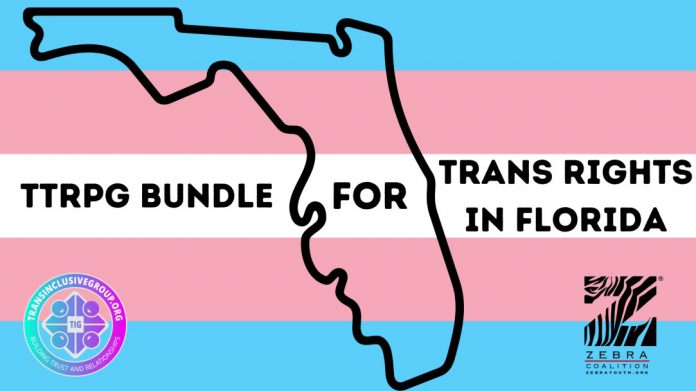This week’s Turn Order is dedicated to an amazing bundle of TTRPG games, supplements, and one-shots dedicated to a noble cause: fighting for transgender youth and rights in the state of Florida. While Organized by Rue (ilananight) and hosted on itch.io, the bundle asks for 5 dollars for access to an absolute wealth of amazing gaming riches. This is a follow-up bundle to a previous Texas based one, and this time the donations go to two specific charities in the state of Florida: Zebra Youth, an Orlando based group that specifically works to help LGBTQI+ youths between the ages of 13-24 throughout the state of Florida, and the Transinclusive Group, a South Florida based organization that works to promote and support LGBTQI+ individuals, and as the recipient of this year’s AIDS Walk in FL, funds donated to TIG will be matched up to $500k, so a little pocket money can truly go a long way.
Transgender Americans face an unprecedented level of legislative and social attack throughout the United States, and Florida is among one of the most aggressive and isolated states for many queer youth and adults. While there are indeed many other states legislating away trans rights and securities, this bundle is specifically focused on helping these two organizations in Florida; in the future, keep an eye out to see if Rue or itch.io organize other bundles for similar states, or even consider how you might get involved in organizing one of your own!
While the bundle itself is an easy ‘you can go without a coffee for a day’ purchase for many, we wanted to also touch on the fact that this bundle is *absolutely loaded with value*. There are some truly amazing TTRPG games in here, ranging from full-fledged titles such as We Deal in Lead, Thirsty Sword Lesbians and more, to zine sized games and solo journaling games. Five dollars nets you a donation to a great cause that, by the time of this publication, has likely already reached it’s goal, but also gives you access to 500+ items. If you love TTRPGs and story-telling based games, it can be hard to find a better value than 100x your investment! But, to perhaps entice you to broaden your horizons and point out some absolute gems that you might miss out on, we’ve compiled a list of games here that were a great time.
Marcy
Before I get into the games I want to talk about, I wanted to leave a personal note here. TTRPGs were part of my own journey to understanding and accepting myself as a trans woman; I’ll never forget my first ever RPG character, a feminine man who transformed like a magical girl into a fierce witch (there were, of course, no signs). Role-playing and the communities it’s allowed me to be a part of and create have always been a huge part of my life, and now more than ever I’ve found that these games and their communities have continued to be a way to help foster that sense that I’m not as alone as the constant drum of anti-trans and anti-queer sentiments can make it seem. For any of our readers who are similarly feeling isolated and alone, just know that your communities and friends are there, and in the off chance that there are any scared trans youths who happen across this little article, you’ll make it. It can be scary and frightening and isolating, but you’ll make it through. I did, you will too.
And now, onto the games!
Thirsty Sword Lesbians
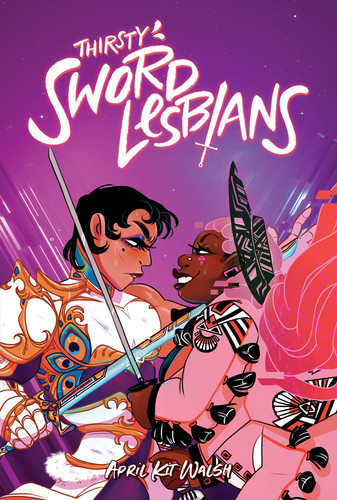
There are a lot of really great games in this bundle, but Thirsty Sword Lesbians by creator Gay Spaceship Games might be the one players might be familiar with. I’ve seen hardback copies in LGS racks, and for good reason: this game rules. The immediate response might be to think of this as Revolutionary Girl Utena: The RPG, and while some of that is applicable, the game is really just a fun, sapphic, queer good time of derring adventure and swashbuckling swordplay. Players assume the role of one of various types of, well, Thirsty Sword Lesbians, engaging in various bouts of conflict against oppressive forces and your own personal conflicts and urges.
While the theme and scope of the game may not be up to everyone’s taste (the idea of playing your character literally thirsty for romance is a big part of things), there’s a great system here that, above all else, can easily be molded to fit a table’s desires and needs. Romance need not be uncomfortable, corny, or comical, and flirtatious not always simply roleplaying a soap opera; there are a ton of ways to use the tools given in this book to have a great time, even amongst non-lesbian players! The book starts with an amazing affirmation of queer identities and differing bodies, setting the tone for a game that is meant to be inclusive and fun.
TSL uses a PBTA style system of D6 rolls, and provides players with some starter playbooks and ideas for character creation; the book is a whopping 200+ pages of beautiful art and gorgeous world-building, and the limits on the types of stories you can tell with the game are not quite infinite, but extremely vast. Something I truly love about this book is that it provides a lot of ‘pick up and play’ options, as the core theme of the game–romance, flirting, action, and dashing sword based adventure–requires no specific setting. The book offers numerous ideas of how to get started and where to begin, ranging from fantasy, low-technology, medieval, to high-tech, futuristic, modern day and science-fiction.
Perhaps one of my favorite parts of this game isn’t even directly ‘the game’ itself, but the materials provided to help: From “Do you have to be a lesbian” (no, by the way), to how to tell/create comfortable space to/or think of telling trans stories, to my favorite, The World Building Worksheet in the book is a fantastic list of questions that can be used by a singular GM or as a collaborative table exercise to create the tone, mood, and world your group wants to play in. Also, I really love the attention to care: there are copious sections on how to create a comfortable and safe tablespace, a glossary of terms (and when and how some of them should or shouldn’t be used) and constant reminders that the game is meant to be fun, explorative, and above all, really, really queer.
Stacks of Goblins
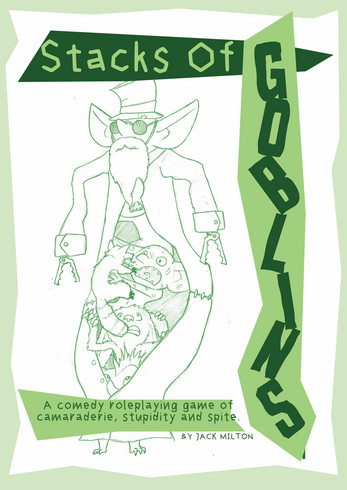
On the smaller scale, Jack Milton’s Stacks of Goblins fits into the role of a delightful and silly (but not stupid) zine style ttrpg experience. The game doesn’t even require a “full” table, playable at 2 and up to 6, meaning that it can be a fun little experience for a small group or a slightly larger than normal one. As one might expect, each player makes up part of a stack of goblins, very much creating the ‘three kids in a trench coat’ joke as an actual game. Mechanically, this is represented by the fact that each goblin in the stack has different dice depending on their position. The ‘head’ gets a d12, but the bottom goblin gets a d8–despite the fact that their choices and actions might actually matter MORE than the ones higher up! Goblins in the middle can add modifiers to rolls to help out, which can be especially important since an 8 is *just* good enough, meaning the bottom goblin has rough time of it to do things without possibility for disaster (or comedy).
One of the funniest parts of playing this game was how spitefully funny players could get to one another, holding grudges for things that happened in previous rolls or events, and yet that spite never felt malicious, but instead chaotically comical, almost as if perfectly designed to evoke the type of “teamwork” a group of goblins would probably actually get up to.
Like many smaller, zine style games, Stacks of Goblins isn’t meant to be the RPG campaign to end all campaigns. Instead, it is a great evening’s fun, and makes for a great game to play with players who may not like, or may not feel wholly comfortable, with TTRPGs for various reasons. There are a lot of little mechanics to make the game silly, light, and fun, and the fact that it works between 2-6 can turn this into more of a party game than a strict dice rolling, stat checking, table consulting slog. Get a few friends, some various dice, and live out your dream of 3 goblins in a trench coat that you’ve always dreamed of playing.
Gubat Banwa
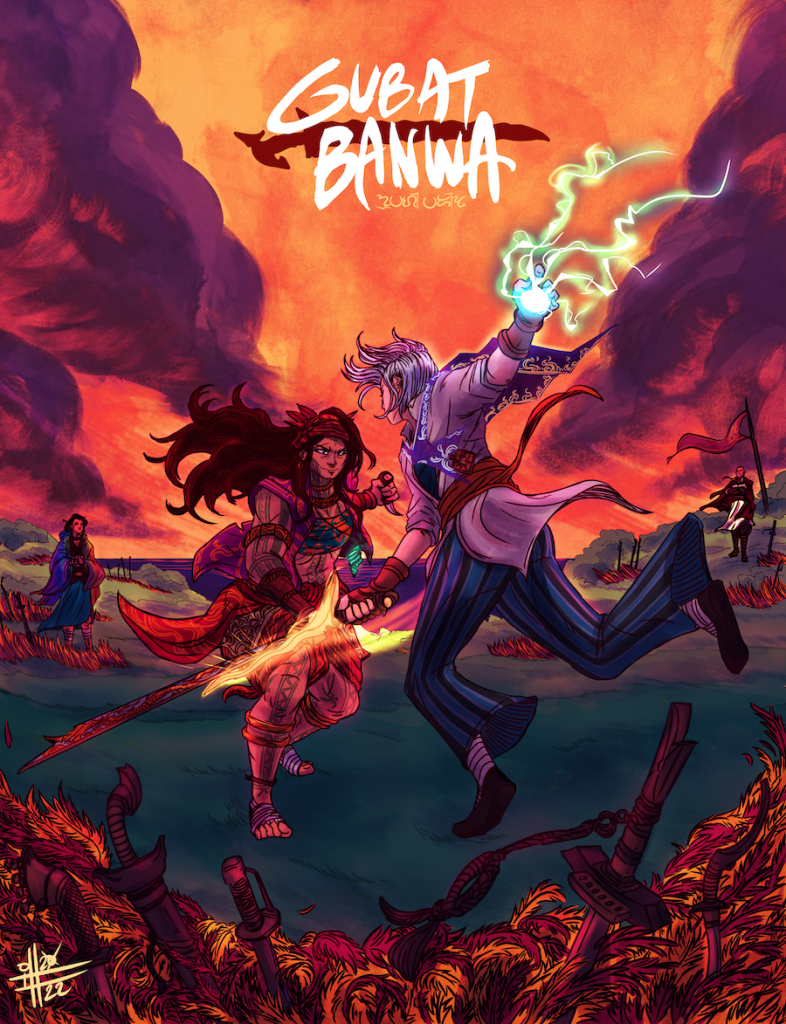
Like Thirsty Sword Lesbians, Gubat Banwa is a titan of a book, a stunningly beautiful and researched game about reclaiming Southeast Asian identity and pride that combines with inventive mechanics and an engaging engine to drive it. What caught my eye about Gubat Banwa was how thoughtfully everything involved in the game wove together. The historical, cultural, and political research and lived experiences mix with a desire to create storytelling narratives and gameplay for groups that either often don’t have a voice, or see very little of themselves represented thoughtfully. That alone is worth cherishing, but the game is also a straight up banger, and one of the most inventive and fun experiences to toy with that I’ve encountered recently. I really love the lead-in material and the touchstones piece, giving players/readers an idea of what went into the creation of the text and how the developers wanted the game and how to play in the space envisioned.
Something important in a game like Gubat Banwa is the respect deserved of the time, effort, and weight of the material. This is not meant to be a stereotypical “Asian” rpg, and players and GMs would do well to be mindful of what tone and world is being created through the game itself. The developers mention who they are wanting the game to be for primarily, but also lay out how to properly approach that even if you or your players are not in those identity groups. There is even care to lay out the types of stories one might tell, or the approaches to the game.
But, if I can reveal one last really, really cool tidbit about Gubat Banwa other than the worldbuilding, lore, and excellently crafted systems? It’s the fact that the game comes with a thoughtfully made solo mode. That’s right. Instead of a separate supplement or offshoot, Gubat Banwa starts off on how to play it by describing the various ways in which to do so solo. While the idea of solo TTRPG play and journaling play have become more common and popular in the wake of COVID, they aren’t usually attached to a book of this size, and yet the way it worked to transform the game into one of journaling and writing one’s adventures down worked so well for me, and I’d urge anyone looking for a deeply rich narrative that can be enjoyed solo or with a full table to consider checking this one out.
Dolls of Theseus
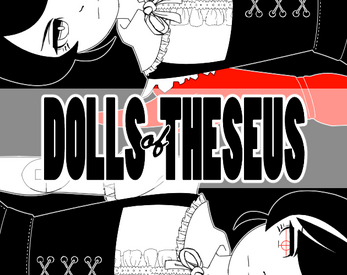
There are also quite a few one-page games in this bundle. While they are generally solo affairs, they also tend to push the envelope on what one can do and explore in a narrative space with simply a few dice, some paper, and an imagination. One of the games that stood out to me was Dolls of Theseus by Nat Twentea, exploring the somewhat deeper complications of sense of self, identity, creating a ‘new’ you, and isolation. There’s a lot going on in this small little one page game, and while there are clear ways to ‘win’ or ‘lose’, like many of these little one pagers, this game wants you to think about the space instead of focus solely on winning.
Perhaps due to the nature of the bundle of games itself, the idea of a game based on and around the construction of self (self identification, societal demands of self versus personal desires of self) and mixed with the ‘Ship of Theseus’ thought experiment really stood out to me. For what it is worth, I ALSO really enjoyed playing it, and my failures felt almost as interesting as my successes. If you’re unfamiliar with one page RPGs, I think Dolls of Theseus is a great start, since it takes itself seriously rather than played as a joke. While a lot of one page games are silly and fun, it doesn’t always create a space to appreciate what’s going on or possible, and I found that authenticity here that I tend to miss in other single page games.
Mandrake Sanctuary
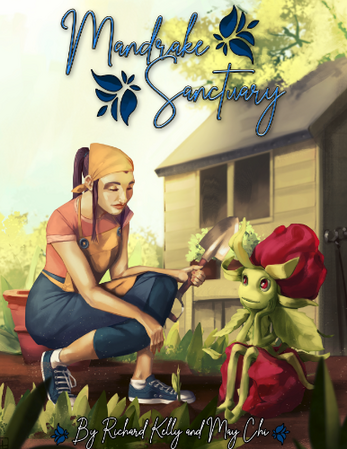
My final choice of game is the long form journaling game, Mandrake Sanctuary by Richard Kelly and May Chi. Journaling games are an expanding genre in TTRPG spaces, and have seen a lot of popularity in the wake of COVID restrictions and lockdowns. While some, such as Thousand Year Old Vampire (which is great, btw) relies on a sense of melancholy, I found Mandrake Sanctuary to be the equivalent of turning Starwdew Valley or Harvest Moon into a writing exercise.
The game is calming and relaxing, and I found it really enjoyable to write (or type) my thoughts and experiences growing various Mandrakes and the imagined things that might occur to it or the people and places it interacted with. The game has few ‘needed’ moves, giving a lot of space to invent and imagine, and at times I had to stop myself from writing too much per day! Of course, you can do whatever you like, but I tried to stay true to the idea of one page a day for the sake of thinking of it like an actual journal.
I like the aspects of physical play in the game too, if you venture to do so without using a digital platform. Things like cutting out, drawing, doodling, and otherwise scribbling your garden, mandrakes, and the things that happen to them were a fun little touch. Overall, the game felt very much like tending a small garden in real time: the trials, tribulations, and small victories of watching things grow and develop under your care, without the need to worry about if you accidentally gave your plant too much water in real life. There’s a ton of charm in this package: soil types, plant types, all sorts of ways to expand or change up the ‘game’ to fit your desires as a Mandrake Gardener!
Luke
Unlike Marcy, I started playing tabletop games years after I figured out I was a transgender man. Still, I have never felt more welcome in a community nor had such an opportunity to explore my identity. There is something so comforting in exploring stories which can be full of characters of any gender or sexuality with no market to appeal to or comment section to avoid. These stories are ours. TTRPGs can be the perfect place to escape from the constant anxiety many of us in the transgender community are feeling right now. This bundle also brings me some comfort in seeing the very material way that so many people are supporting us- both the creators of these games and everyone who purchased the bundle.
I don’t have anything insightful to say, other than to express my love to my transgender siblings. I know how strong all of you are and how beautiful a support network we have formed for each other. Now, try to take a break from fighting. You deserve rest. I think some of the games I’ve picked out could be a good distraction, but these are just a small sample of all the cool things in this bundle.
We Deal in Lead
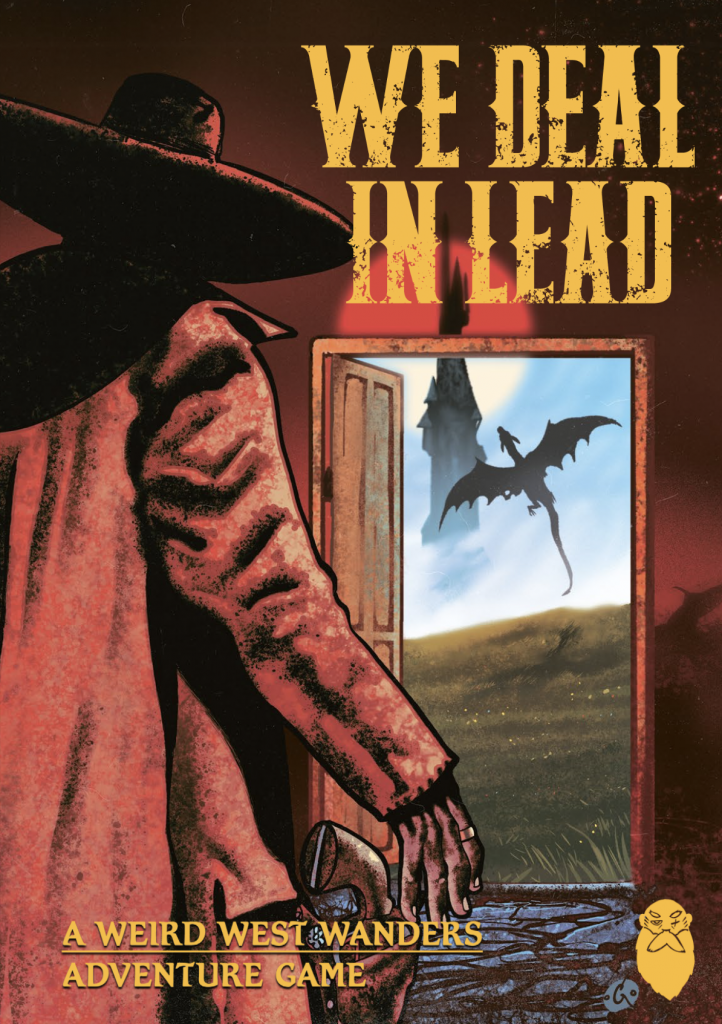
Have you ever wanted to be a magical cowboy traversing worlds and facing eldritch horrors? “We Deal in Lead” might be the game for you. It can feel like you’re getting bogged down with rules because a lot of the flavor text and setting comes later in the book, so it may be better to skim the whole thing before trying to learn mechanics; that shouldn’t be hard as the book comes in at under 100 pages and includes randomization tables, monster stat blocks and very cool illustrations. In this game, being a Gunslinger is being a member of an order with a higher calling, a knight-errant with a personal quest to fulfill. (In fact, a “leader” called an Errant can be chosen for the party.) Your gun is a rare artifact that sets you apart from the rest of humanity as a powerful figure.
If I were to GM this system I may build out a bit more of the setting beyond what the book offers, but what’s offered here quickly filled my mind with what that might look like. This game is not meant to create a straightforward campaign arc. The setting and characters are unique and weird, so the story told using these tools will match. Slip doors, freestanding door frames which serve as portals to other worlds or times, should pop up in unexpected places. The gunslingers can perform rituals and make sacrifices to get closer to their goals, always running the risk of summoning the Eater Outside which moves between the worlds. This game is eerie, combining a very grounded and well-defined cowboy imagery with a sense of unpredictability and magic. The characters are powerful, but so is the world around them and the effect it has on its residents.
Wanderhome
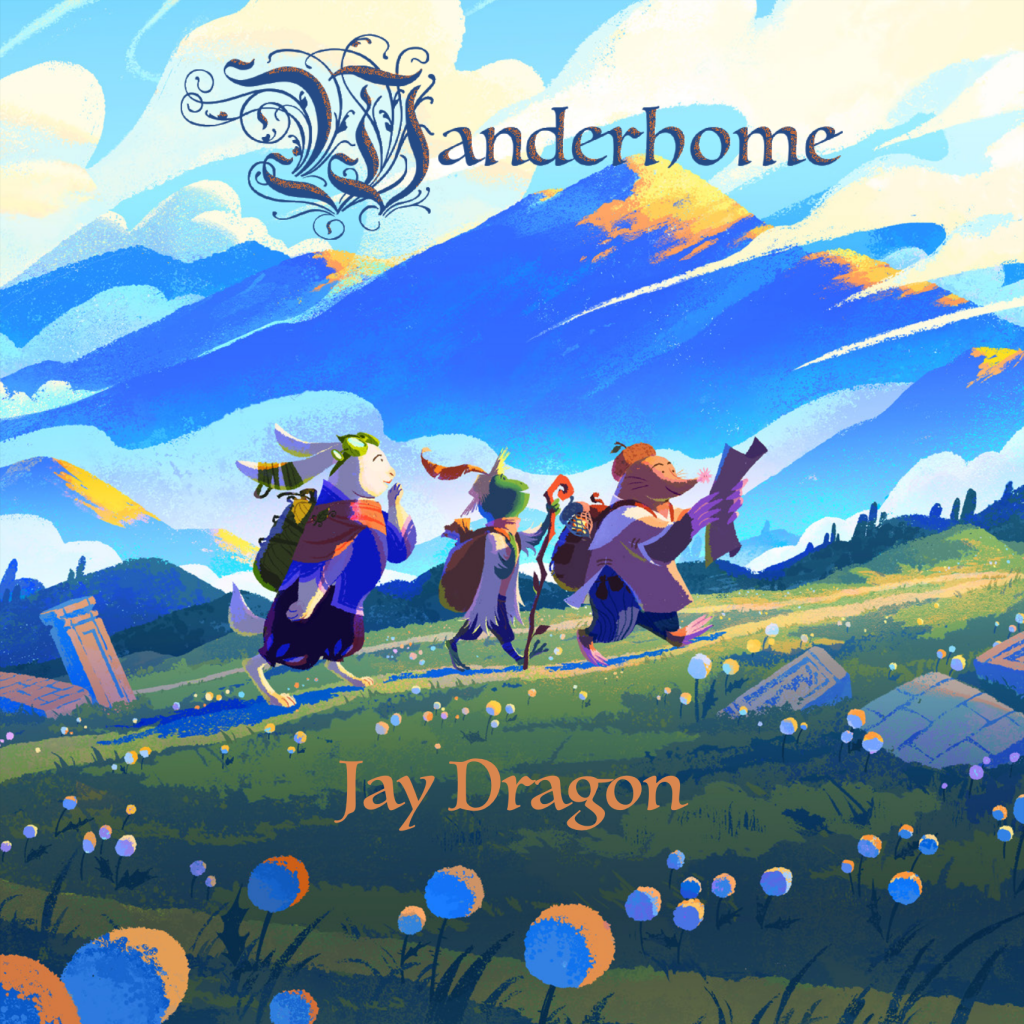
“Wanderhome” is an adorable game about appreciating the journey, letting your feelings lead the way and being a little creature. You can play with or without a GM (guide, as the book calls it) or even by yourself. You decide with the group or roll for the traits of each location right before you get there, discovering the characters and their problems based on the whims of any of the players. Locations and NPCs get notecards of information and can be controlled by any player who picks them up. Small or forgotten gods stay at the periphery of the stories, controlled by no one. Playbooks highlight how each character cares for others and the world around them and have the bittersweet feeling of characters with a storyto tell, whether it will be a happy one or not.
The game feels a lot like the “Redwall” stories but with somewhat lower stakes. It’s built around the idea of being kind to yourself and to others, helping without trying to be a hero. Every NPC can be assumed to be a genuinely good person, though for the more powerful ones “that goodness has likely been poisoned by struggle.” Even the guidebook reads like being invited to play with the neighbor kids, to create a space where you decide whether the world is mystical or comfortingly mundane. It recommends leaving the real world outside and exploring this cozy space and your character’s emotions without trying to be an allegory for anything larger. Setup for this game shouldn’t take very long, so it’s an easy one to pull out and play when everyone just needs a relaxing activity. If you’re having trouble convincing anyone to play it, just pull up some of the art from the book. I’ve convinced at least ten different people to give it a shot this way.
Sherwood
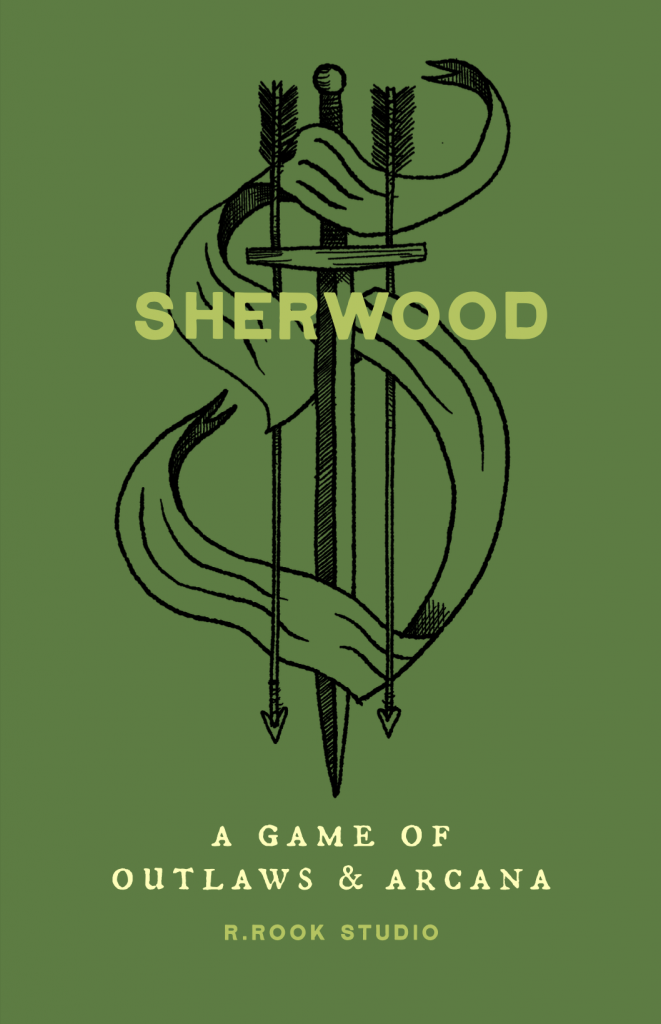
“Sherwood” is “Robin Hood” for anarchists, encouraging players to be outlaws in their disdain for a monarchist society and in determining their own places in society. Characters achieve their goals with their Luck, Wits, Willpower and Endurance, all of which are expendable resources. Character creation comes with built-in backstory elements to create a figure of legend with clear motivations for becoming an outlaw. Any type of character can have arcane powers, but those have drawbacks as you’ll likely be called a witch by local villagers. Whether you were a criminal from an early age or a cavalier who fell from grace, you’ll fit into the outlaw band your group creates. Your goals and reputation are shared with your band. There’s a clear focus on finding community by grouping with those who have been exiled from society.
The book comes in at only 32 pages, but that space is used well. There are a variety of character traits and backgrounds to combine, combat rules, cool spell options, GM resources like stat blocks and even some quick starter adventures. Opponents can be either human or fey, but the idea of the game is to fight the power. Core setting components state not only that “the king is an ass” but that the villains have great resources and will keep fighting for more power. The best RPGs I have ever played have centered around those conversations of what power means and where your characters fall into the system. This game has that and mystical fey creatures and living in the woods with your best friends. If you’re not a “Robin Hood” fan, that’s okay. There is a universality to this kind of fantasy story that allows you to shape it into something entirely new.
The Bagel Game
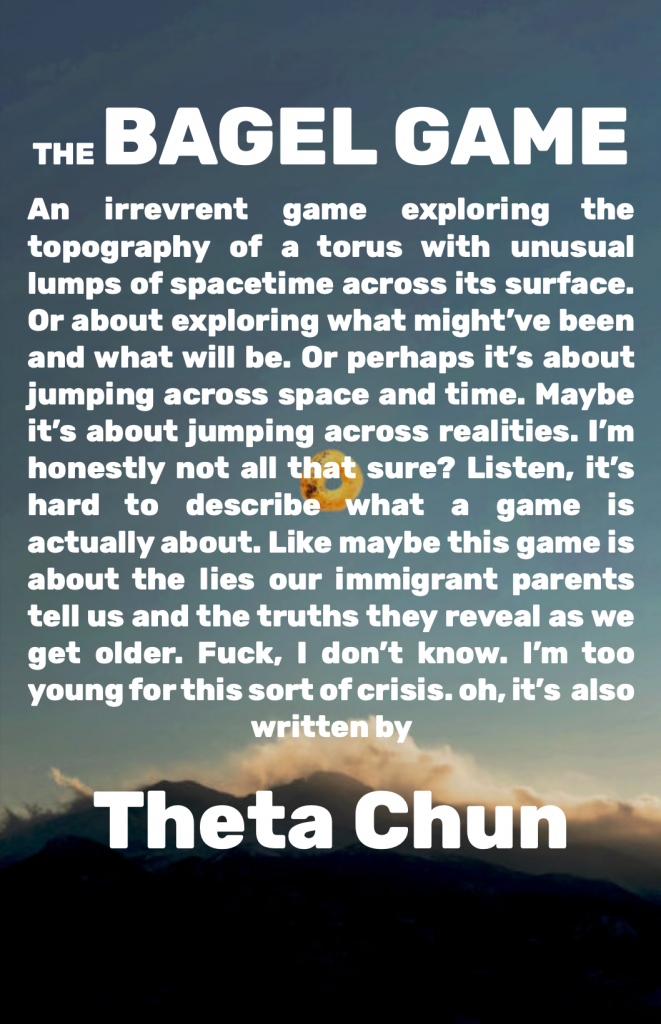
“Everything Everywhere All At Once” is my favorite movie that I never shut up about so I immediately pounced on “The Bagel Game.” It’s an ode to the movie in story and theme, a sci-fi game that’s really all about family. Players pull from alternate universes to gain success. This is illustrated by a unique 4d6+d4 dice system: you roll 4d6, then roll a d4 to determine which d6’s result you use. If you’re pulling abilities from another universe (Salting the Bagel) you get to choose to switch to another die’s result at the cost of some tokens. Another thing that makes this game unique is that the players all must be members of a family. Playbooks include the Mother, Daughter, Father and Grandparent. Each is the Storyteller for a different playbook, meaning they set the DCs and narrate consequences to that player in a sort of round robin system.
This is an incredibly unique and weird system. Even the game book represents the multiverse concept: each page is designed as an homage to a TTRPG with recognizable graphic design, like Mork Borg or Dungeons & Dragons 5e. Player abilities focus entirely around their relationships to each other and how they can affect the family despite the reality-bending ability to access alternate timelines. Even the sci-fi elements reflect back on the familial relationship, though, forcing the player to reveal a way they have contributed to the conflict the family is currently facing. I am simultaneously excited and terrified to play this one with my friends because it does not hold back in its commentary on familial relationships and emotional challenges.
Butterfly Court
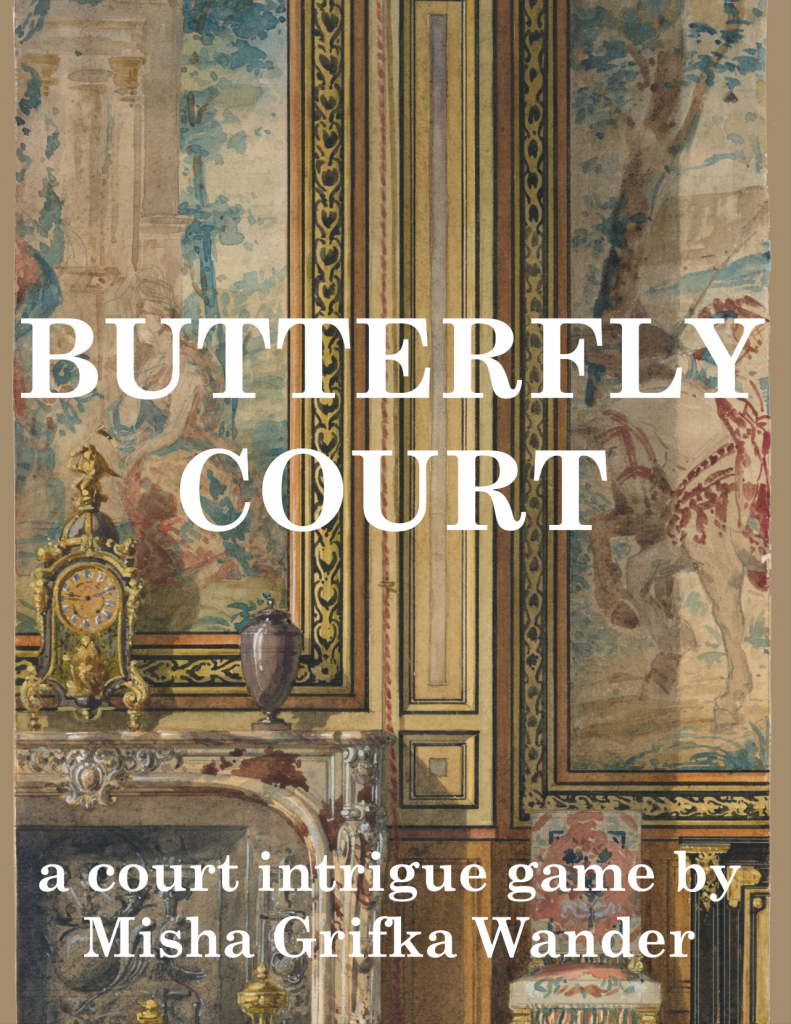
“Butterfly Court” is a court intrigue game, perfect for anyone who likes a little drama and gossip without real-life repercussions. It’s about the smaller players in a court who need to maneuver complex social interactions to gain traction for personal and political goals. Players work together to choose a conflict and then pick opposing Factions; it can be as important as which heir to the throne to support or as light as whether astrology or tea leaf reading is more effective. Either way, the story will still be backed by some pretty serious threats to the kingdom like a curse on the royal family or an ongoing drought.
Play carries forward in three stages:
- Idle dreaming, when players discuss who they want to highlight and the general events they want to see in the next scene.
- Scenes, when the players actually interact as their characters and move the plot along.
- Reactions, when the players track which Faction is in the lead and narrate how that is affecting the world.
This system allows for a structured game where a plot can move forward quickly without any one player needing to serve as GM. Each player is constantly being invited to request what they want to see happen rather than just react to the world around them. This allows for tense social dynamics and tricky conversations without those feelings flowing over into inter-player tension. Instead of the more common TTRPG moves of physical attacks, they can push and pull the world around them with social influence. One thing this game might benefit from is more playbook options, but those included are great for determining personal ambitions and values to create conflict within the ongoing Faction competition. Make some tea, practice your fanciest character voice and figure out the best way to stir up a scandal.
The TTRPG Bundle for Trans Rights in Florida can be purchased on itch.io here.
